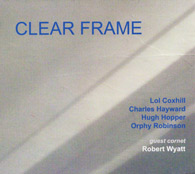
Clear Frame
Clear Frame
(Continuity…
records)
For this writer, the album titled Numero D’Vol was the one most
deserving the title "Surprise Album of the Year" of 2007. For
two main reasons: first, for demonstrating that an idiom that by now is
considered to be tired and beyond any hope of rejuvenation – not to mention
any hope of sounding fresh again – could still be able to appeal to (and
emotionally connect with) listeners who didn’t necessarily regard the idiom
in question with blind faith; then (but this is something that obviously
comes first), for featuring a brand-new quartet where Hugh Hopper (bass),
Simon Picard (saxophone), Steve Franklin (keyboards) and Charles Hayward
(drums) had "sailed though different genres" while skillfully
using the studio; i.e., a mixture of "played" and
"artificial" music that I really hoped to catch live, the group’s
rhythm section – Hopper/Hayward – being totally new to me.
(What’s this idiom I’m talking about? Well, Numero D’Vol speaks an instrumental-only
dialect that’s part of the glorious language called Canterburian. What
Canterburian means, and whether it really exists, is something that will
be discussed at another time.)
So it’s only logical that Clear Frame faced an uphill battle with this writer:
first, due to a recorded sound that – though good enough, and obviously
capable of showing what was essential for the music – when compared to
the clear sound of Numero D’Vol appeared a bit too much on the cloudy side,
though never devoid of coherence when considered as a whole; and also for
the approach chosen here, of the "improvised" kind (but where
"styles" and "tonal centers" are always in full view)
with a quartet playing "in real time".
Starting from the end, let’s say that it’s quite easy to define Clear Frame
as a good album with even higher peaks. An album that, in my opinion, grows
with each listening session (I have to say that it greatly benefited from
a playing volume that was a bit higher than what’s usual for me, in order
to reveal its many qualities). (Though I have to admit that it’s quite
easy for me to paint a picture of a type of listener that will like Clear
Frame a lot more than Numero D’Vol.)
The musicians are well-known. Hugh Hopper is on bass, Charles Hayward on drums
and some sort of keyboards. From his playing on albums by Kevin Ayers to
his quite original solo improvisations, what’s easier to recognize than
Lol Coxill’s soprano sax? Alas, reality being quite different, though he’s
had quite a long and varied career, Coxill’s is far from being a household
name. I really hope that Clear Frame could turn to be a first step towards
a wider appreciation. I’m a bit ashamed to admit that I’ve never heard
of Orphy Robinson, who on this album plays vibraphone, steel pan, percussion,
and… FX.
There’s also Robert Wyatt on cornet. It’s without a doubt a "jazzy" cornet
(something which was not too difficult to imagine), when a "softness" that’s quite similar to Miles Davis’s in his "acoustic" period
gives place to a more rhythmic
"jumpy" approach not too far from Don Cherry’s; sometimes his mumblings
in the lower register reminded me of Roswell Rudd’s trombone.
The album has a nice start with Clean Slate: Davis-like cornet, steel pan,
relaxed tempo, drums (wide in the stereo spectrum) played using brushes, clean, deep electric bass, a soprano sax that reminded me quite a
bit of (the late) Elton Dean’s saxello… Well, the whole reminded me a
lot of Side One of Fifth by Soft Machine, the one where Phil Howard’s on
drums, but this didn’t rub me the wrong way at all; six minutes later,
Wyatt’s cornet brings the track to its close. It’s a very fine piece, and
though – as elsewhere on the album – Coxill sounds a bit more
"Dean-like" than his usual, I think it can be said to be due to
the surrounding framework.
A quarter of an hour long, Tin Plate never bores the listener: "funky" drums
and a highly-processed bass guitar start the piece, then we have percussion,
soprano sax and some keyboards "from space"; at about 6’30" the
vibes make their entrance, being played by… Bobby Hutcherson! It’s Orphy
Robinson, really, playing well all over this album: agile percussion, Trinidad-like
steel pans, "cool" vibes. At about 11′ a nice bass motive by
Hopper takes the piece to its close: fast, resembling Soft Machine quite
a bit.
Some keyboards that reminded me of Joseph Zawinul appear on Noise Gate. Void
Crate is a brief intermezzo which gives the listener time to breathe. Both
High Rate and Better Late are in medium tempo, the latter again featuring
the vibes, and with "Free" phrasing by Wyatt’s cornet.
Paperweight really made me think of Out To Lunch by Eric Dolphy: It starts
with a quite easy-to-get opening statement by Coxill, then vibes, and bass
and drums playing swing! Cornet in the low register. A very nice piece.
Processed bass, synthesizer, soprano sax and a meditative
cornet are the main characters in the closing track, Figure Eight.
Beppe Colli
© Beppe Colli 2008
CloudsandClocks.net | Jan. 27, 2008


